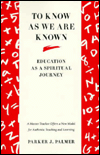In To Know As We Are Known: Education as a Spiritual Journey by Parker J. Palmer (San Francisco, CA: HarperOne, 1993), 160 pp, $13.95 ISBN-10: 0060664517), author, activist, teacher and nationally recognized educational expert, offers a new model for knowing, learning and teaching. He engages the reader in an exploration of how mind and heart can work together in seeking truth, pointing to education for whole persons, which includes not only cognitive learning but also emotional learning. He admits that he is searching for a “holistic way†of knowing which can be translated into practical ways to teach and to learn. He seeks to offer through his writing “a way of knowing and educating that might heal rather then wound us and our world†(Palmer, p. 2), the latter of which he posits conventional education has indeed done in objectifying people and things.

In the first part of the book, Palmer lays the groundwork for “spiritual education,†with an emphasis on knowing as loving. He states that rather than being inspired by curiosity and control, the two primary sources from history, another kind of knowledge is available to us in compassion or love. He discerns that knowing is relational and fosters community. He concludes that “to know something or someone in truth is to enter troth [covenant] with the known, to rejoin with new knowing what our minds have put asunder†(Palmer, p. 31).
At Trinity Church, Baptist (where I minister along side the members of the faith community in the role of their pastor), we believe that we educate in faith through relationships, by becoming “part of each other’s life and fate†(Palmer, p. 31). We seek to increase the quality and depth of our relationships with others, the world and our Creator. We struggle to be an alternative to a culture which often objectifies people and things.
Therefore, Palmer’s words resonate with me/us. We concur that “we are known in detail and depth by the love that created and sustains us, known as members of a community of creation that depends on us and on which we depend†(Palmer, p. 11).
Palmer challenges the reader to look beyond the conventional methods of teaching. Proceeding in a logical and easy to follow manner, Palmer briefly analyzes conventional methods before concentrating on an alternative way of teaching and learning. He uses the tale of the fourth century desert fathers and mothers, and story of Abba Felix and his spiritual tradition in particular, to define teaching as “creating space in which obedience to truth is practiced†(Palmer, p. 69). As the book continues, Palmer observes that “learning space has three essential dimensions: openness, boundaries, and an air of hospitality†(Palmer, p. 71).
Palmer engages the reader in an exploration of how important it is for the teacher/learner to know his or herself. Thus, of particular value is Palmer’s discussion on the spiritual formation of teachers. Again using the story of Abba Felix, and specifically Abba Felix’s response to the brothers, “there are no more words nowadays†as a springboard, Palmer points to the inward work teachers need – to disciplines that practice love, to the practices of silence and solitude, and to prayer “which brings us to the edge of a great mystery where we become inarticulate, where our knowledge fails†(Palmer, p. 125).
At times Palmer’s citations of other scholars and theologians seem excessive and in the way of his own writing. This is not to diminish the impact or criticize the inclusion of well placed quotations, but rather to suggest that some of the quotations prove to be repetitive, and perhaps not necessary to the otherwise masterful conversation on education as a spiritual journey.
Reviewed by guest blogger, Rev. Nancy Rock Poti
Pastor, Trinity Church, Baptist. Richmond, VA

